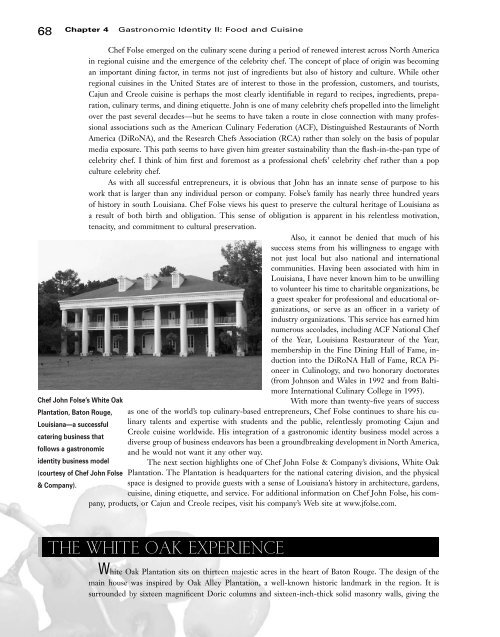food-and-wine-pairing-a-sensory-experience-robert-harrington
food-and-wine-pairing-a-sensory-experience-robert-harrington
food-and-wine-pairing-a-sensory-experience-robert-harrington
Create successful ePaper yourself
Turn your PDF publications into a flip-book with our unique Google optimized e-Paper software.
68<br />
Chapter 4 Gastronomic Identity II: Food <strong>and</strong> Cuisine<br />
Chef Folse emerged on the culinary scene during a period of renewed interest across North America<br />
in regional cuisine <strong>and</strong> the emergence of the celebrity chef. The concept of place of origin was becoming<br />
an important dining factor, in terms not just of ingredients but also of history <strong>and</strong> culture. While other<br />
regional cuisines in the United States are of interest to those in the profession, customers, <strong>and</strong> tourists,<br />
Cajun <strong>and</strong> Creole cuisine is perhaps the most clearly identifiable in regard to recipes, ingredients, preparation,<br />
culinary terms, <strong>and</strong> dining etiquette. John is one of many celebrity chefs propelled into the limelight<br />
over the past several decades—but he seems to have taken a route in close connection with many professional<br />
associations such as the American Culinary Federation (ACF), Distinguished Restaurants of North<br />
America (DiRoNA), <strong>and</strong> the Research Chefs Association (RCA) rather than solely on the basis of popular<br />
media exposure. This path seems to have given him greater sustainability than the flash-in-the-pan type of<br />
celebrity chef. I think of him first <strong>and</strong> foremost as a professional chefs’ celebrity chef rather than a pop<br />
culture celebrity chef.<br />
As with all successful entrepreneurs, it is obvious that John has an innate sense of purpose to his<br />
work that is larger than any individual person or company. Folse’s family has nearly three hundred years<br />
of history in south Louisiana. Chef Folse views his quest to preserve the cultural heritage of Louisiana as<br />
a result of both birth <strong>and</strong> obligation. This sense of obligation is apparent in his relentless motivation,<br />
tenacity, <strong>and</strong> commitment to cultural preservation.<br />
Also, it cannot be denied that much of his<br />
success stems from his willingness to engage with<br />
not just local but also national <strong>and</strong> international<br />
communities. Having been associated with him in<br />
Louisiana, I have never known him to be unwilling<br />
to volunteer his time to charitable organizations, be<br />
a guest speaker for professional <strong>and</strong> educational organizations,<br />
or serve as an officer in a variety of<br />
industry organizations. This service has earned him<br />
numerous accolades, including ACF National Chef<br />
of the Year, Louisiana Restaurateur of the Year,<br />
membership in the Fine Dining Hall of Fame, induction<br />
into the DiRoNA Hall of Fame, RCA Pioneer<br />
in Culinology, <strong>and</strong> two honorary doctorates<br />
(from Johnson <strong>and</strong> Wales in 1992 <strong>and</strong> from Baltimore<br />
International Culinary College in 1995).<br />
Chef John Folse’s White Oak<br />
With more than twenty-five years of success<br />
Plantation, Baton Rouge, as one of the world’s top culinary-based entrepreneurs, Chef Folse continues to share his cu-<br />
Louisiana—a successful linary talents <strong>and</strong> expertise with students <strong>and</strong> the public, relentlessly promoting Cajun <strong>and</strong><br />
Creole cuisine worldwide. His integration of a gastronomic identity business model across a<br />
catering business that<br />
diverse group of business endeavors has been a groundbreaking development in North America,<br />
follows a gastronomic<br />
<strong>and</strong> he would not want it any other way.<br />
identity business model The next section highlights one of Chef John Folse & Company’s divisions, White Oak<br />
(courtesy of Chef John Folse Plantation. The Plantation is headquarters for the national catering division, <strong>and</strong> the physical<br />
& Company).<br />
space is designed to provide guests with a sense of Louisiana’s history in architecture, gardens,<br />
cuisine, dining etiquette, <strong>and</strong> service. For additional information on Chef John Folse, his company,<br />
products, or Cajun <strong>and</strong> Creole recipes, visit his company’s Web site at www.jfolse.com.<br />
THE WHITE OAK EXPERIENCE<br />
White Oak Plantation sits on thirteen majestic acres in the heart of Baton Rouge. The design of the<br />
main house was inspired by Oak Alley Plantation, a well-known historic l<strong>and</strong>mark in the region. It is<br />
surrounded by sixteen magnificent Doric columns <strong>and</strong> sixteen-inch-thick solid masonry walls, giving the


